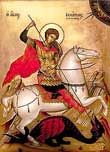St.George Russian Orthodox Church
THE GREAT LENT (March 2 – April 18 2020)
We are passing through the field of Great Lent to purify our souls, to sanctify ourselves by the grace of God, to root ourselves in the truth of God, and to learn how to withstand sin, evil, and unrighteousness, first of all in our own lives. Lent is a tool which man can use to truly affect the state of his soul because through abstinence from food, entertainments, and various types of temptations, we train our will, and we elevate our senses. Fasting and prayer are great means of elevating the soul, overcoming sins, and transforming the inner state of a man. It especially belongs to us in Great Lent to use these means to help ourselves, to change our inner world, and to be closer to God. The days of Great Lent are given to us that we might think about our inner lives, analyze our thoughts and actions, and determine how far we are able to resist sinful temptations, and how far we are ready to build our lives according to God’s law. The time of Great Lent is a time of battling with vice—with pride and envy. We are given the saving days of Great Lent to contemplate the mystery of salvation, which God opened to us in Christ, and contemplating salvation, of which each of us can become an inheritor, we try, relying on the help of God, to conquer our feeble but real attraction to sin, overcoming vice and renewing our connection with God, which is our sole means of attaining salvation.
Great Lent is the 40-day season of spiritual preparation that comes before the most important Feast of the Christian year, Holy Pascha (which means “Passover” and is commonly called “Easter”,).
The first week of Lent is especially strict. On Monday, Tuesday and Wednesday, a total fast is kept. In practice, very few people are able to do this. Some find it necessary to eat a little each day after sunset. Many Faithful do fast completely on Monday and then eat only uncooked food (bread, fruit, nuts) on Tuesday evening. On Wednesday, the fast is kept until after the Presanctified Liturgy.
From the second through the sixth weeks of Lent, the general rules for fasting are practised. Meat, animal products (cheese, milk, butter, eggs, lard), fish (meaning fish with backbones), olive oil and wine (all alcoholic drinks) are not consumed during the weekdays of Great Lent. Octopus and shell-fish are allowed, as is vegetable oil. On weekends, olive oil and wine are permitted.
Fish, oil and wine are allowed on the Feast of the Annunciation (April 7) and on Palm Sunday (one week before Easter April 12). On other feast days, such as the First and Second Finding of the Head of Saint John the Baptist (March 9), the Holy Forty Martyrs of Sebaste (March 22), the Forefeast of the Annunciation (April 6) and the Synaxis of the Archangel Gabriel (April 8), wine and oil are permitted.
The week before Easter, Holy Week is a special time of fasting separate from Great Lent. Like the first week, a strict fast is kept. Some Orthodox Christians try to keep a total fast on Holy Monday, Holy Tuesday and Holy Wednesday. Most eat a simple Lenten meal at the end of each day before going to the evening Church services.
On Holy Thursday, wine is allowed in remembrance of the Last Supper. Holy Friday is kept as a strict fast day, as is Holy Saturday. Holy Saturday is the only Saturday in the entire year when oil is not permitted.
The Lenten Fast is broken following the midnight Easter service. With the proclamation, “Christ is risen!” the time of feasting begins. The week after Easter is called Bright Week and there is no fasting. For the next 40 days, the Church celebrates the Paschal (Easter) season. Joy and thanksgiving are the fulfilment of our Lenten journey.
